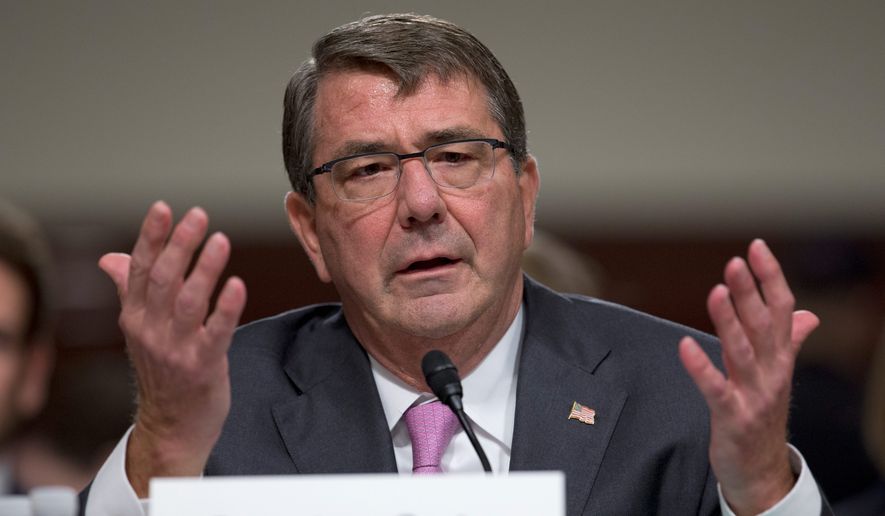WASHINGTON (AP) — Defense Secretary Ash Carter spoke with his Russian counterpart Friday, the first step in direct military talks proposed by Russia about Moscow’s military buildup to support the Syrian government against the Islamic State group.
The 50-minute conversation marked the first time that American and Russian defense chiefs have spoken in more than a year amid U.S. anger over Russian invasion and annexation of Ukraine’s Crimea region.
And it came as the U.S. has been flummoxed over how to respond to Russia’s increased support for Syrian President Bashar Assad and has been worried it will interfere with the ongoing U.S. and coalition campaign against Islamic State militants in Syria.
Pentagon press secretary Peter Cook said Carter and Russia Defense Minister Sergei Shoigu had a constructive talk about the need to “de-conflict” the Russian buildup with the anti-Islamic State effort.
A senior U.S. official said Shoigu told Carter that Russia’s increased military activities are defensive in nature, and designed to honor Moscow’s commitments to the Assad government.
Russian Defense Ministry spokesman Maj. Gen. Igor Konashenkov issued a statement noting that “the course of the conversation has shown that the sides’ opinions on the majority of issues under consideration are close or coincide. The ministers noted the restoration of contacts between the countries’ defense ministries and agreed to continue consultations. “
Secretary of State John Kerry told reporters in London that President Barack Obama believes military-to-military discussions with Russia are “an important next step” as the U.S. and its allies seek to resolve a worsening Syria crisis while also trying to understand Russia’s burgeoning role. Russian Foreign Minister Sergey Lavrov first broached the idea earlier this week in a phone call with Kerry and Shoigu initiated the call to Carter on Friday.
“This (Syria) crisis has got to be solved,” Kerry said before meeting with the United Arab Emirates Foreign Minister Abdullah bin Zayed in London.
The U.S. official also said Carter and Shoigu talked mostly about fighting the Islamic State and that Carter pressed for a parallel diplomatic conversation between the two nations over how to reach a peaceful political resolution in Syria. Such talks have been occurring intermittently since 2012, however. Recent efforts have also included Saudi Arabia. The official was not authorized to discuss the call publicly and spoke on the condition of anonymity.
Russia has called for a broad coalition to fight the Islamic State group and has indicated that helping Assad’s military is the best way to do that. However, U.S. policy has centered for the duration of the more than four-year civil war in Syria on the assertion that Assad must step down to make way for a new government. Until recently, Russia seemed to agree with that policy. But in recent weeks, it has become clear that Moscow intends to create an air operations base in Syria and has sent personnel, equipment and tanks to the coastal province of Latakia.
And on Friday, a spokesman for Russian President Vladimir Putin said Russia would consider sending troops to fight in Syria if Damascus requested them.
In a statement, Cook said that during the call Carter “emphasized the importance of pursuing such consultations in parallel with diplomatic talks that would ensure a political transition in Syria. He noted that defeating ISIL and ensuring a political transition are objectives that need to be pursued at the same time.”
It’s not clear if Gen. Martin Dempsey, chairman of the Joint Chiefs of Staff, or other U.S. military leaders will also reach out to their counterparts.
U.S. officials said in recent days that they are trying to glean the precise reasoning behind Moscow’s recent deliveries.
After their third phone call on the Syria situation since Labor Day weekend, Kerry said Wednesday that Lavrov had proposed a “military-to-military conversation and meeting in order to discuss the issue of precisely what will be done to de-conflict with respect to any potential risks that might be run and have a complete and clear understanding as to the road ahead and what the intentions are.”
“You have to have a conversation in order to do that,” Kerry said previously. “It is vital to avoid misunderstandings, miscalculations (and) not to put ourselves in a predicament where we are supposing something and the supposition is wrong.”
Kerry said Lavrov had told him that Russia was only interested in confronting the threat posed by the Islamic State group in Syria. But Kerry stressed that that remained unclear.
“Obviously, there are questions about that,” he said. “I am not taking that at face value.”
However, Kerry added that if Russia’s attention is on the Islamic State group, then it remains a potential partner in pushing for a political transition in Syria. “If Russia is only focused on ISIL and if there is a capacity for cooperation … there still is a way to get a political negotiation and outcome,” Kerry said, using an alternate acronym for the Islamic State.
A U.S. intelligence official said Russia’s moves in Syria reflect growing alarm about Assad’s ability to weather opposition gains and suggests that Moscow may be willing to intervene directly on his behalf. Russia’s military involvement raises a number of concerns, especially because it does not appear to be coordinated with the other countries operating in the area, said the official, who was not authorized to speak publicly about the subject and spoke on condition of anonymity.
___
Dilanian reported from London.




Please read our comment policy before commenting.